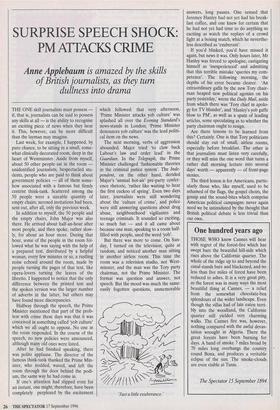SURPRISE SPEECH SHOCK: PM ATTACKS CRIME
Anne Applebaum is amazed by the skills
of British journalists, as they turn dullness into drama
THE ONE skill journalists must possess if, that is, journalists can be said to possess any skills at all — is the ability to recognise an exciting piece of news when they hear it. This, however, can be more difficult than the layman may imagine.
Last week, for example, I happened, by pure chance, to be sitting in a small, some- what clinically decorated room, deep in the heart of Westminster. Aside from myself, about 50 other people sat in the room unidentified journalists, bespectacled stu- dents, people who are paid to think about government policies — all of them some- how associated with a famous but firmly centrist think-tank. Scattered among the 50 people were a sizeable quantity of empty chairs; xeroxed invitations had been, sent out, after all, only the previous week.
In addition to myself, the 50 people and the empty chairs, John Major was also there. He arrived about half-an-hour after most people, and then spoke, rather slow- ly, for about an hour more. During that hour, some of the people in the room fol- lowed what he was saying with the help of a prepared text, distributed by a helpful woman; every few minutes or so, a rustling noise echoed around the room, made by people turning the pages of that text, like opera-lovers turning the leaves of the libretto. I happened to notice that the only difference between the printed text and the spoken version was the larger number of adverbs in the latter, but others may have found more discrepancies.
Halfway through the speech, the Prime Minister mentioned that part of the prob- lem with crime these days was that it was conceived in something called 'yob culture' which we all ought to oppose. No one in the room responded. In the course of the speech, no new policies were announced, although many old ones were listed.
After he had finished speaking, there was polite applause. The director of the famous think-tank thanked the Prime Min- ister, who nodded, waved, and left the room through the door behind the podi- um, the same way he had come in.
If one's attention had slipped even for an instant, one might, therefore, have been completely perplexed by the excitement which followed: that very afternoon, `Prime Minister attacks yob culture' was splashed all over the Evening Standard's news-stands in London; 'Prime Minister denounces yob culture' was the lead politi- cal item on the news.
The next morning, verbs of aggression abounded. Major tried 'to claw back Labour's law and order lead' in the Guardian. In the Telegraph, the Prime Minister challenged 'fashionable theories in the criminal justice system'. The Inde- pendent, on the other hand, derided Major's 'annual hot-air' pre-party confer- ence rhetoric, 'rather like waiting to hear the first cuckoo of spring'. Even two days later, journalists were still wondering about the 'culture of crime', and police were still answering questions about drug abuse, neighbourhood vigiliantes and teenage criminals. It sounded so exciting, so much fun — and it all came about because one man, speaking to a room half- filled with people, used the word 'yob'.
But there was more to come. On Sun- day, I turned on the television, quite at random, and noticed another man sitting in another airless room. This time the room was a television studio, not West- minster, and the man was the Tory party chairman, not the Prime Minister. The format was question and answer, not speech. But the mood was much the same: easily fogotten questions, unmemorable `Just a little exuberance.' answers, long pauses. One sensed that Jeremey Hanley had not yet had his break- fast coffee, and one knew for certain that he had not yet had time to do anything so exciting as watch the replays of a crowd fight at a boxing match, which he neverthe- less described as 'exuberant'.
If you'd blinked, you'd have missed it again, but news it was. Only hours later, Mr Hanley was forced to apologise, castigating himself as 'inexperienced' and admitting that this terrible mistake 'queries my com- petence'. The following morning, the depths of his error became clearer. 'An extraordinary gaffe by the new Tory chair- man heaped new political agonies on his party yesterday,' wrote the Daily Mail, aside from which there was 'Tory chief in apolo- gy for TV blunder', and 'Hanley's yob gaffe blow to PM', as well as a spate of leading articles, some speculating as to whether the party chairman ought to resign.
Are there lessons to be learned from this? Certainly. One is that Tory politicians should stay out of small, airless rooms, especially before breakfast. The other is that journalists must listen very carefully, or they will miss the one word that turns a rather dull morning lecture into several days' worth — apparently — of front-page stories.
The third lesson is for Americans, partic- ularly those who, like myself, used to be ashamed of the flags, the gospel choirs, the gossip and the sound-bites which comprise American political campaigns: never again need we be intimidated by the thought that British political debate is less trivial than our own.


























































 Previous page
Previous page